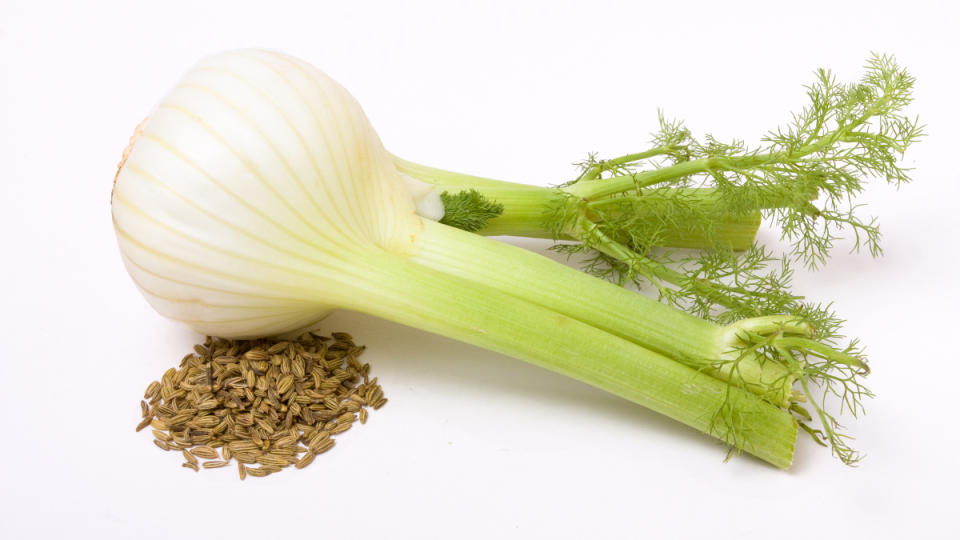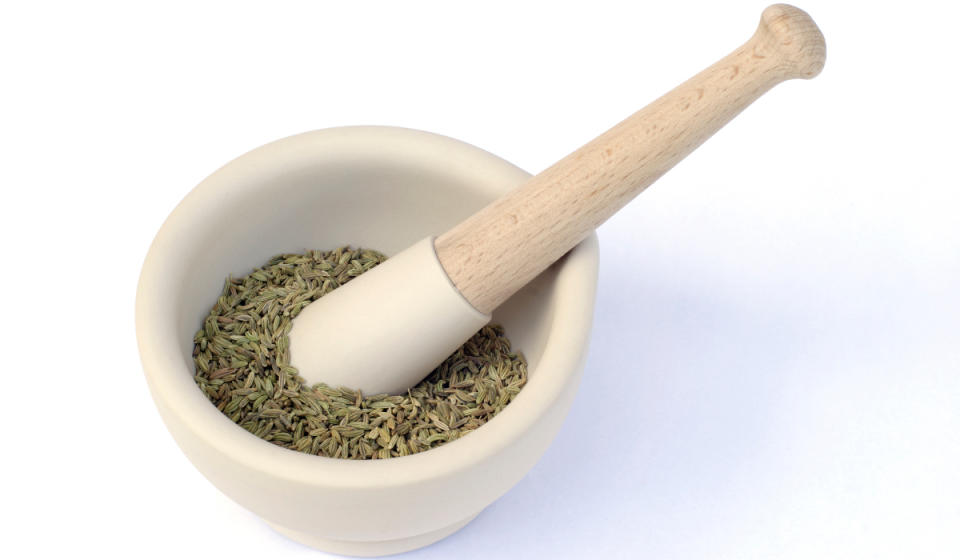How Fennel Tea Can Help Ease Bloat, Calm Stress + Boost Sleep
If you’ve never cooked with fennel before, its big bulb and feathery leaves may seem a bit intimidating. But this underrated veggie can deliver powerful health benefits. Fennel is known for its mild, earthy flavor with a subtle hint of black licorice. The bulb can be eaten raw or roasted, and the feathery leaves can be used as an herb. But fennel’s true claim to fame is its seeds, which can be used to make fennel tea, a staple in traditional medicine. So what is fennel tea good for? Experts say it can ease digestive issues like gas and bloating, safeguard your heart, improve your sleep and more. Here’s what you need to know.
5 health benefits of fennel tea
Fennel seeds — which are used to make tea — provide a wide range of healthful vitamins and minerals, including calcium, magnesium and potassium. They also contain anethole, a medicinal plant compound with anti-inflammatory effects.
Fennel tea has a calming effect that can benefit your brain and your body. Sipping it daily offers a host of health benefits, and it's particularly good for GI troubles, stress or insomnia. While it's true that any type of tea will step up your health game, whether you’re sipping a rooibos, chamomile, or lavender brew, fennel tea offers a few unique benefits that make it a worthy addition to your daily routine.

1. Fennel tea eases gas and bloating
For centuries, people have been sipping fennel tea for gas, bloating, constipation and indigestion. Fennel’s anti-inflammatory properties can help to relieve digestive issues, according to a study in the journal PLOS ONE. A review in BioMed Research International credits this calming effect to the phytochemicals found in fennel. That includes flavonoids, phenolic compounds, fatty acids and amino acids.
“Fennel tea can help with digestion by lowering intestinal tract inflammation and alleviating bloating,” explains William Read, RDN, a nutrition consultant for Lasta. “It has ingredients like anethole, which may aid in gastrointestinal muscle relaxation and facilitate more easily digested food.”
Related: Does Green Tea Help With Bloating? Yes! Plus, It Speeds Weight Loss + Helps Blood Sugar
2. Fennel tea calms cramps
The same anti-inflammatory properties that calm stomach discomfort can also provide pain relief throughout the body — especially when it comes to period pain, Read says. One study found that fennel reduced menstrual pain intensity by as much as 78%. And a separate review in the journal Nutrients found that fennel is as effective as conventional pain relief medications when it comes to relieving menstrual cramps.
Bonus: While fennel excels at reducing menstrual discomfort, the benefits don't stop there. Fennel seed extract has also shown promise as a natural pain reliever for women with knee pain from osteoarthritis, suggests a study in Complementary Therapies in Clinical Practice.
3. Fennel tea protects your heart
“Fennel tea has anti-inflammatory and antioxidant properties to support heart health,” says Catherine Gervacio, registered nutritionist-dietitian and certified exercise nutrition coach with E-Health Project.
In particular, fennel seeds are packed with flavonoids, a type of plant compound with powerful antioxidant properties. Flavonoids can fight free radicals and combat oxidative stress, both of which hamper heart health. And according to the American Heart Association, flavonoids also help to reduce the risk of cancer and heart disease, lower blood pressure, and prevent blood clots.

4. Fennel tea tames stress and improves sleep
Can’t seem to power down after a long day? Brew a cup of fennel and watch your stress level drop. “It has a mild sedative effect to soothe a tired mind and body,” Gervacio adds. “Fennel tea is caffeine-free, so it can contribute to good quality sleep, too!” Fennel has long been used in traditional medicine to treat insomnia. In fact, research suggests it can cut anxiety symptoms in half, making it markedly easier to doze off after a hectic day. (Need extra helping drifting off to dreamland? Click through to learn how holy basil tames stress and aids sleep, too.)
5. Fennel tea speeds weight loss
Trying to shed a few stubborn pounds? Cozying up with a cuppa can help. One 10-year study found that people who drank tea regularly reduced their body fat by 20%. And fennel tea in particular is a smart bet. Why? “Fennel tea works as a natural hunger suppressant, which may help with weight loss,” Read says. “It can make you feel full, which lessens the chance that you'll overeat.”
And as Gervacio adds, “its diuretic properties may help reduce water retention, which contributes to a temporary weight loss effect. It can also potentially aid in eliminating toxins in the body, contributing to healthy weight loss.”
How to make fennel tea
The easiest way to make fennel tea is by crushing the seeds with a mortar and pestle to release the oils, then steeping them in hot water for 5 to 10 minutes. You can buy fennel seeds at supermarkets, health foods stores and online. One to try: Spice Train Fennel Seeds (Buy from Amazon, $11.99).

If you’re not a huge fan of licorice-flavored sips, don’t worry. Fennel tends to have a sweeter and milder flavor than the anise used to make licorice. But you can always squeeze in a bit of lemon, grapefruit, or fresh orange juice for a zestier flavor. Or add a small amount of honey for extra sweetness, Gervacio suggests.
If you’re drinking fennel tea for gas or bloating, double down on the digestive benefits by adding ginger to your cuppa. Ben Carvosso, a chiropractor, nutritionist and founder of MP Nutrition, suggests a simple recipe. Add 1 tsp. of crushed fennel seeds and a 1" cube of ginger (finely chopped) to boiling water. Simmer for 10 minutes, then strain and add honey and lemon to taste. Or try a bagged fennel tea, such as Traditional Medicinals Organic Fennel Tea (Buy from Amazon, $6.17).
Need a visual aid? Check out the quick how-to brewing video below.
How much fennel tea should you drink?
Fennel tea is good for health, but it turns out you can have too much of a good thing. Board-certified emergency medicine physician John Cunha, DO, suggests steeping 1 to 2 grams of crushed fennel seed (around ? tsp to 1 tsp) in 5 oz. of boiling water as a safe daily amount.
Side effects of fennel are rare, but may include stomach upset or seizures. Because fennel is in the same family as carrots and celery, you may want to skip it if you’re allergic to either of those foods. Additionally, research suggests people with a peach allergy may also be more likely to have a fennel allergy.
Fennel tea can affect levels of the hormone estradiol, so pregnant women may want to avoid drinking it. Research suggests fennel may also cause a slightly heavier menstrual flow for some. As with any herbal tea, be sure to let your doctor know if you drink thew brew regularly to avoid any potential interactions with other medications.
or more healing teas:
Could This TikTok-Trendy Tea Be the Next Superfood? What to Know About Chaga
This content is not a substitute for professional medical advice or diagnosis. Always consult your physician before pursuing any treatment plan.
Woman's World aims to feature only the best products and services. We update when possible, but deals expire and prices can change. If you buy something via one of our links, we may earn a commission. Questions? Reach us at [email protected]
